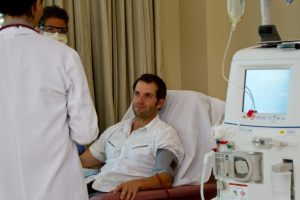 Kidney failure risk is greater in chronic kidney disease patients who also have atrial fibrillation. The research findings pave the way for further exploring the link between these conditions which could potentially lead to improved treatments.
Kidney failure risk is greater in chronic kidney disease patients who also have atrial fibrillation. The research findings pave the way for further exploring the link between these conditions which could potentially lead to improved treatments.
Patients with chronic kidney disease often progress to kidney failure, requiring dialysis or a kidney transplant. It has been well established that many kidney disease and kidney failure patients also have atrial fibrillation. This increases the risk of stroke as well as death.
Advertisement
The study involved 206,229 adults with chronic kidney disease who were followed for five years. During this time period, nearly 16,400 patients developed atrial fibrillation, and those patients had a 67 percent higher risk of progressing to kidney failure, compared to patients who did not develop atrial fibrillation.
Kidney specialist Nisha Bansal explained, “These novel findings expand on previous knowledge by highlighting that atrial fibrillation is linked to a worse kidney prognosis in patients with underlying kidney dysfunction.”
First author of the study Alan S. Go added, “There is a knowledge gap about the long-term impact of atrial fibrillation on the risk of adverse kidney-related outcomes in patients with chronic kidney disease. This study addresses that gap and may have important implications for clinical management by providing better prognostic information and leading to future work determining how to improve outcomes in this high-risk group of patients.”
Causes and symptoms of kidney failure
Kidney failure can occur when a person already has a condition impairing kidney function, when direct damage is experienced to the kidneys, or when the kidneys’ drainage tubes become blocked.
Causes of impaired blood flow to the kidneys include blood or fluid loss, blood pressure medications, heart attack, heart disease, infection, liver failure, use of aspirin or related drugs, severe allergic reactions, severe burns, and severe dehydration.
Advertisement
Causes that lead to kidney damage include blood clots in the veins, cholesterol deposits that block blood flow, inflammation of the tiny filters in the kidneys, premature destruction of red blood cells, infection, lupus or other autoimmune conditions, certain medications, multiple myeloma, scleroderma, blood disorders, toxins in the blood like alcohol, and inflammation of blood vessels.
There are also diseases and conditions that block urine passages, leading to acute kidney failure. These conditions include bladder cancer, blood clots in the urinary tract, cervical cancer, colon cancer, enlarged prostate, kidney stones, nerve damage, and prostate cancer.
Symptoms of kidney failure include:
- Decreased urine output
- Fluid retention
- Drowsiness
- Shortness of breath
- Fatigue
- Confusion
- Nausea
- Seizures or coma in severe cases
- Chest pain or pressure
At the sign of any of these symptoms, you should see a doctor right away.
